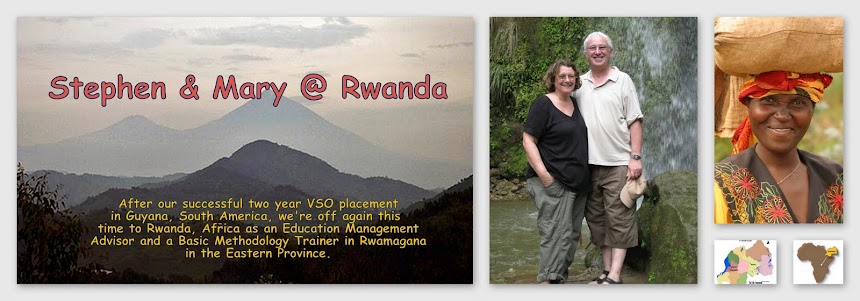A typical welcome from primary children
Click on picture to start video
 Whenever times get hard and they often do here, all we have to do is visit a school and see the children and the spirits are lifted. We have started working in a Groupe Scolaire School in Rwamagana. In order to meet the Millenium Goals and their own 2020 Vision Statement, the Rwanda Government have extended most primary schools to include three years of secondary. Some of these schools are as big as 2,500 children in a double shift and the teachers work with two lots of kids from 7am to 5pm.
Whenever times get hard and they often do here, all we have to do is visit a school and see the children and the spirits are lifted. We have started working in a Groupe Scolaire School in Rwamagana. In order to meet the Millenium Goals and their own 2020 Vision Statement, the Rwanda Government have extended most primary schools to include three years of secondary. Some of these schools are as big as 2,500 children in a double shift and the teachers work with two lots of kids from 7am to 5pm. Generally when we enter a school, it will create an enormous fuss but after a few visits things settle down. These children have rarely seen a white person in real life let alone be able to shake their hands and stroke their arms to see if they really have any skin. Multiply that by a thousand and you can imagine the commotion. Well, that's at breaktime but when we enter the classes, we nearly always have the same reception. They all stand and say "Welcome, our visitors, we are fine." Tell them to sit down and they reply "We are sitting down". Then there's the welcome song in English, French and Kinyarwanda. The smiles on the faces are infectious and the love of learning in such challenging circumstances can only be admired. English school children have a lot to learn about motivation and the thirst for knowledge.
All teaching is now done in English with only a few months notice. Most of the teachers are a few pages ahead of the children and it seems to be working. We have enormous admiration for the tenacity and bravery of a country which has taken its own future in its hands with some help from others and, through its children, has taken on board the need for developping the skills of its young people to create a better world for them in the future.
We are looking forward to a brand new office in a couple of months but in the meanwhile we are working in the back of a container truck. The few staff in the office are very busy and it's been difficult to arrange a meeting to organise a our work but finally it's happened and we are on the right track. We've planned a number of workshops including several for newly qualified teachers in different parts of the District, two days for newly appointed Headteachers from all over the District and a series of one day workshops for Heads in each of the sectors throughout the District. In addition we have started working with quite a few individual schools as well as doing orientation visits to find out more about the area.
In the last few days we have been compiling statistics about schools, numbers of students and teachers and have produced an 11 page spreadsheet. Still a lot more to be done on that but it will be a useful tool for the office and the Ministry.
In Guyana, we used to go to schools by bicycle, taxi, Ministry vehicle and more often than not boats. Here it's quite different. The schools in the town are generally walking distance but widespread so we seem to be constantly walking. That's fine in the morning but changing over to another school in the afternoon can be rather warm. The alternative is a moto - pillion on a motor cycle taxi. Relatively cheap but for the longer distances with hills and potholes rather hazardous and hard on the body. The longest we've done is an 80 minute return journey, weaving all over the place on a red road with grooves, potholes and other hazards such as children all over the place. We're working up to the 2 hour ones. As you can imagine we are feeling fitter and losing weight. The positive side is that the countryside is stunning with ever inch of its thousand hills cultivated and the welcome is unimagineable in most schools so it's really worth it.
Most of the schools are built in the same style with an enormous courtyard / field / garden / play area in the middle with classrooms all round the edges. Generally classes are in straight rows with a blackboard full length on one wall. Class sizes can be as much as 60 for the lower primary and sometimes that in later years but there is a considerable dropout in the years in between. We have not seen any poor behaviour but claases that listen to their teacher with respect and which cooperate whatever the standard of the lesson. About one third of the schools are private and fee paying, often parental coperatives.



No comments:
Post a Comment
Hi, hope your enjoy reading about our adventures in Rwanda. We'd love to hear from you. Stephen and Mary